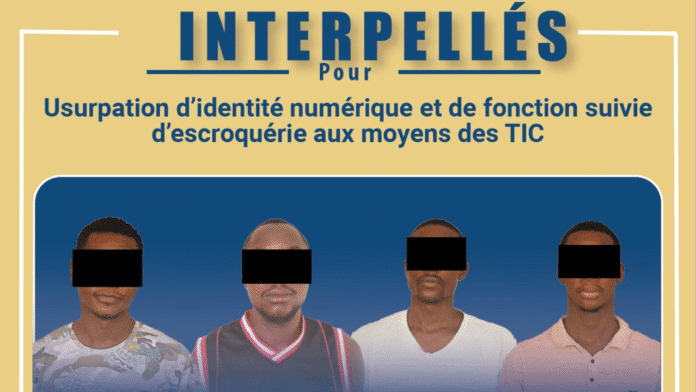In a significant victory against online fraud, the Central Brigade for the Fight Against Cybercrime (BCLCC) in Burkina Faso has apprehended four suspected cybercriminals involved in elaborate online scams. Operating across different parts of the country, the suspects were brought to justice following extensive investigations. Their schemes, ranging from identity theft to fake government initiatives, defrauded victims of nearly 2.7 million CFA francs. The case underscores the rising threat of cyber scams in West Africa and the critical need for digital vigilance.
According to an official statement released by the BCLCC, the suspects aged between 24 and 30 were involved in various forms of cyber-enabled fraud using information and communication technologies (ICTs). The investigation revealed two separate operations:
- The Fraudulent Charity Network:
A trio identified as K.D. (decorator), T.D., and C.K. (both retail employees) formed a criminal network masquerading as representatives of charitable organizations. Their method involved calling catering businesses and food suppliers under the guise of placing large orders for orphanages or religious communities. To qualify for these “orders,” victims were asked to provide a civil liability certificate. Exploiting time constraints, victims were then redirected to a supposed insurance company contact—actually one of the fraudsters—who issued a fake certificate in exchange for a mobile money payment. As soon as the money was transferred, all contact ceased. - The Botanical Business Scheme:
This same trio also orchestrated scams around the sale of moringa sap, neem oil, and “sodium apple” (a plant claimed to have medicinal properties). Pretending to work with a pharmaceutical company, they invited victims to become “business partners” for product supply. Once engaged, victims were connected to another fraudster acting as a liaison for sample procurement. Victims were manipulated into paying various fake fees including transport costs, forestry and customs taxes via mobile money. Again, once payments were received, the scammers cut all ties. - The Fake Scholarship Facilitator:
A fourth individual, Z.H., operated independently. He created a fake Facebook profile under the alias “Oubda Abdoul Faical” and used several stolen phone numbers to approach university students. Claiming to be a representative of the government’s “1 Student, 1 Laptop” program, he convinced students they could obtain subsidized laptops by filling out a form sent via WhatsApp. After collecting personal information, Z.H. demanded registration fees, again paid via mobile money. He would send fabricated proof of enrollment to gain trust, only to disappear once the money was received.
Financial and Legal Outcomes
After being apprehended and questioned, all suspects confessed to their crimes. They have been presented to the Prosecutor of Faso at the High Court of Ouagadougou I to face charges. The total financial damage from their collective schemes is estimated at 2,675,850 CFA francs (approximately $4,400 USD). Authorities also believe that the network leader and additional accomplices may be based abroad, complicating the full dismantling of the operation.
A Growing Threat in the Digital Era
The BCLCC emphasized that these types of scams are becoming increasingly common in Burkina Faso and the wider West African region. The mix of mobile payment systems, social media, and weak digital literacy makes the population particularly vulnerable to cyber fraud. Fake charities, government impersonation, and business opportunity scams have emerged as recurring themes in recent cybercrime reports.
10 Expert Recommendations to Prevent Future Online Scams
- Verify All Requests for Payment: Always confirm the legitimacy of any organization requesting money or documents, especially via WhatsApp or social media.
- Be Skeptical of Unsolicited Offers: Avoid engaging with unknown individuals who contact you out of the blue with too-good-to-be-true proposals.
- Use Official Channels: For government programs or partnerships, only rely on information published on verified official websites and accounts.
- Cross-Check Identity Claims: If someone claims to work for a government agency or charity, demand an official ID or email confirmation.
- Limit What You Share on Social Media: Fraudsters mine personal details to create convincing lures. Protect your data.
- Enable Two-Factor Authentication (2FA): Secure all your accounts with 2FA to reduce the risk of being impersonated.
- Report Suspicious Messages Promptly: Don’t ignore unusual requests. Report them to BCLCC or law enforcement via their official contact points.
- Check Domain Names and Email Addresses: Fraudsters often use slightly altered domain names to trick victims.
- Educate Staff and Students: Raise awareness among employees, small businesses, and students on how cyber scams work.
- Monitor Mobile Money Transactions: Always confirm the recipient’s identity before completing a transaction—especially if rushed.
Conclusion:
This successful operation by the BCLCC is a critical reminder that cybercrime continues to evolve, targeting unsuspecting citizens with more sophisticated and emotionally manipulative tactics. From impersonating charities to exploiting government credibility, these scams exploit trust in society and institutions.
As Burkina Faso strengthens its digital ecosystem, the fight against cybercrime must remain at the forefront of public policy. The BCLCC’s proactive approach offers a template for regional cybersecurity agencies: combine digital forensics with public education and cross-border cooperation to safeguard communities in an increasingly connected world.
The public is urged to remain vigilant, exercise caution online, and report any suspicious activities to the BCLCC through its official channels. This collaborative vigilance is key to dismantling digital crime networks before they can expand further.


